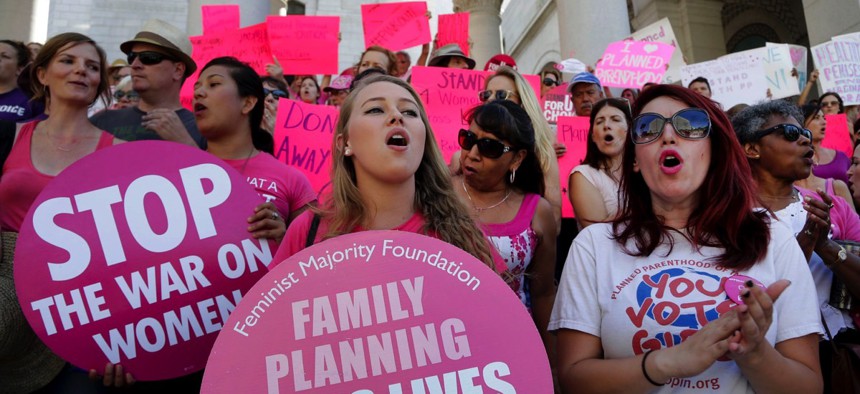Scoring U.S. Cities on Their ‘Reproductive Freedom’

Planned Parenthood supporters rally for women's access to reproductive health care on "National Pink Out Day'' at Los Angeles City Hall in Sept. 2015. Nick Ut / AP Photo

Connecting state and local government leaders
San Francisco earned top marks, according to a new National Institute for Reproductive Health report. Where does your city rate?
San Francisco leads the 40 most populous U.S. cities on reproductive health, rights and justice policies, according to the new Local Reproductive Freedom Index released Wednesday by the National Institute for Reproductive Health.
The first-of-its-kind index relies on 37 policy indicators to evaluate inclusive municipal access to clinics that offer abortion services, funding and coverage for reproductive health care—giving high marks to New York City, Chicago, Los Angeles, Seattle and Philadelphia.
NIRH, a New York City-based advocacy group, began working at the local level about a decade ago during the presidency of George W. Bush, who was viewed as hostile to reproductive health policies.
“Compared to the current Trump administration, he seems a lot more tame now than he did then,” Andrea Miller, NIRH president, told Route Fifty in a phone interview. “We had no idea that we’d be facing the kind of severe rollbacks that we’re seeing from the federal government.”
Earlier this month, the U.S. Department of Health and Human Services rolled back the Affordable Care Act's requirement that employers include birth control coverage in health insurance plans—should they cite religious objections.
Miller’s hope is that NIRH’s creation of an index will “stir a little friendly competition amongst cities” to prioritize reproductive health when preemptive state anti-abortion laws and clinic closures are at record highs.
By NIRH’s count, 21 cities in the report advanced undocumented immigrants’ access to reproductive health care, eight cities protected access to abortion clinics, nine cities urged Congress to pursue federal policy solutions, 31 cities improved funding for the treatment of sexually transmitted infections, and 17 cities taught comprehensive sexuality education in public schools.
Coastal communities tended to score higher on the index because of their often larger budgets, but even cities in states that heavily regulate reproductive health care like Columbus, Ohio have seen some success expanding women’s access. In Columbus’ case, the city passed an ordinance protecting access to reproductive health care facilities without fear of harassment or violence.
Missouri lawmakers have threatened to preempt St. Louis’ ordinance adding “reproductive health decisions” to the list of things employers and landlords can’t discriminate against.
Even Jacksonville, Florida, which scored lowest on the index with 1 star to San Francisco’s 4.5 stars, was applauded for its own anti-discrimination ordinance.
Miller advises cities of every size and budget to ensure the policies they fund reflect their values, even something as simple as a pilot project evaluating how to improve reproductive health care access.
Secondly, cities can advocate for better policies at the state and federal levels.
“That’s a really powerful bully pulpit to have,” Miller said. “And when you have multiple multiplicities do that, it can create a groundswell.”
Lastly, every city can ensure it has a reproductive health and sexual education infrastructure in place.
A total of 28 out of 40 cities had one good policy in place, according to the report.
In 2008, NIRH partnered with then-New York City Mayor Michael Bloomberg to establish abortion training for all Ob-Gyn medical residents in the city, where many doctors nationally are schooled. Abortion and miscarriage training draws from the same knowledge base, so the program ensures pregnant women will receive truly comprehensive treatment from the doctors that come out.
The program further underscores that city solutions are more impactful when partnering with advocacy groups and vice versa.
“Too often then politics of abortion get in the way of women’s health,” Miller said.
Dave Nyczepir is a News Editor at Government Executive’s Route Fifty and is based in Washington, D.C.

NEXT STORY: No Social Security Number? No Lights





